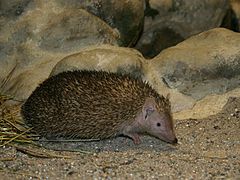Tenrekokształtne
| Tenrecomorpha | |||
| Butler, 1972[1] | |||
 Przedstawiciel podrzędu – tenreczynek jeżowaty (Echinops telfairi) | |||
| Systematyka | |||
| Domena | eukarionty | ||
|---|---|---|---|
| Królestwo | zwierzęta | ||
| Typ | strunowce | ||
| Podtyp | kręgowce | ||
| Gromada | ssaki | ||
| Podgromada | żyworodne | ||
| Infragromada | |||
| Rząd | afrosorkowce | ||
| Podrząd | tenrekokształtne | ||
| Synonimy | |||
| |||
| rodziny | |||
| |||
| |||
Tenrekokształtne[3] (Tenrecomorpha) – podrząd ssaków z rzędu afrosorkowców (Afrosoricida).
Zasięg występowania
Tenrekokształtne występują na obszarze Afryki (włącznie z Madagaskarem)[4].
Systematyka
Do podrzędu należą następujące rodziny[5][4][3]:
- Tenrecidae J.E. Gray, 1821 – tenrekowate
- Potamogalidae Allman, 1865 – wodnice
Opisano również wymarłe rodzaje o niepewnej pozycji systematycznej[6]:
- Jawharia Seiffert, Simons, Ryan, Bown & Attia, 2007[7] – jedynym przedstawicielem był Jawharia tenrecoides Seiffert, Simons, Ryan, Bown & Attia, 2007
- Nanogale Pickford, 2019[8] – jedynym przedstawicielem był Nanogale fragilis Pickford, 2019
- Qatranilestes Seiffert, 2010[9] – jedynym przedstawicielem był Qatranilestes oligocaenus Seiffert, 2010
- Widanelfarasia Seiffert & Simons, 2000[10]
Przypisy
- ↑ P.M. Butler: The problem of insectivore classification. W: K.A. Joysey & T.S. Kemp (redaktorzy): Studies in Vertebrate Evolution. Edinburgh: Oliver and Boyd, 1972, s. 262. ISBN 978-0-05-002131-6. (ang.).
- ↑ É.L. Trouessart. Catalogue des mammifères vivants et fossiles. „Revue et Magasin de Zoologie pure et Appliquée”. 3e série. 7, s. 272, 1879. (fr.).
- ↑ a b Nazwy polskie za: W. Cichocki, A. Ważna, J. Cichocki, E. Rajska-Jurgiel, A. Jasiński & W. Bogdanowicz: Polskie nazewnictwo ssaków świata. Warszawa: Muzeum i Instytut Zoologii PAN, 2015, s. 19–20. ISBN 978-83-88147-15-9. (pol. • ang.).
- ↑ a b C.J. Burgin, D.E. Wilson, R.A. Mittermeier, A.B. Rylands, T.E. Lacher & W. Sechrest: Illustrated Checklist of the Mammals of the World. Cz. 1: Monotremata to Rodentia. Barcelona: Lynx Edicions, 2020, s. 106–111. ISBN 978-84-16728-34-3. (ang.).
- ↑ N. Upham, C. Burgin, J. Widness, M. Becker, C. Parker, S. Liphardt, I. Rochon & D. Huckaby: Treeview of Mammalian Taxonomy Hierarchy. [w:] ASM Mammal Diversity Database (Version 1.11) [on-line]. American Society of Mammalogists. [dostęp 2023-08-12]. (ang.).
- ↑ J.S.J.S. Zijlstra J.S.J.S., Tenrecomorpha Butler, 1972, Hesperomys project (Version 23.6.0), DOI: 10.5281/zenodo.7654755 [dostęp 2023-08-14] (ang.).
- ↑ E.R. Seiffert, E.L. Simons, T.M. Ryan, T.M. Bown & Y. Attia. New remains of Eocene and Oligocene Afrosoricida (Afrotheria) from Egypt, with implications for the origin(s) of afrosoricid zalambdodonty. „Journal of Vertebrate Paleontology”. 27 (4), s. 967, 2007. DOI: 10.1671/0272-4634(2007)27[963:NROEAO]2.0.CO;2. (ang.).
- ↑ M. Pickford. Tiny Tenrecomorpha (Mammalia) from the Eocene of Black Crow, Namibia. „Communications of the Geological Survey of Namibia”. 21, s. 17, 2019.
- ↑ E.R. Seiffert. The oldest and youngest records of afrosoricid placentals from the Fayum Depression of northern Egypt. „Acta Palaeontologica Polonica”. 55 (4), s. 607, 2010. DOI: 10.4202/app.2010.0023. (ang.).
- ↑ E.R. Seiffert & E.L. Simons. Widanelfarasia, a diminutive placental from the late Eocene of Egypt. „Proceedings of the National Academy of Sciences”. 97 (6), s. 2646, 2000. DOI: 10.1073/pnas.040549797. (ang.).










